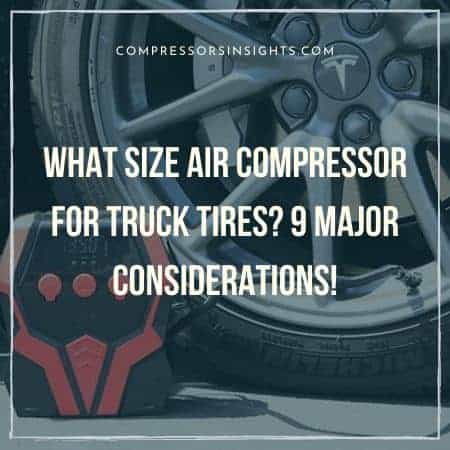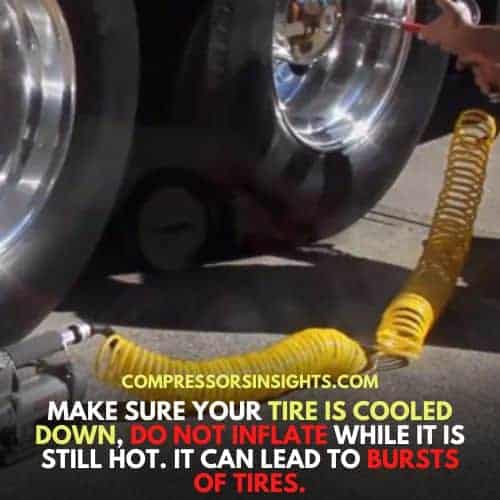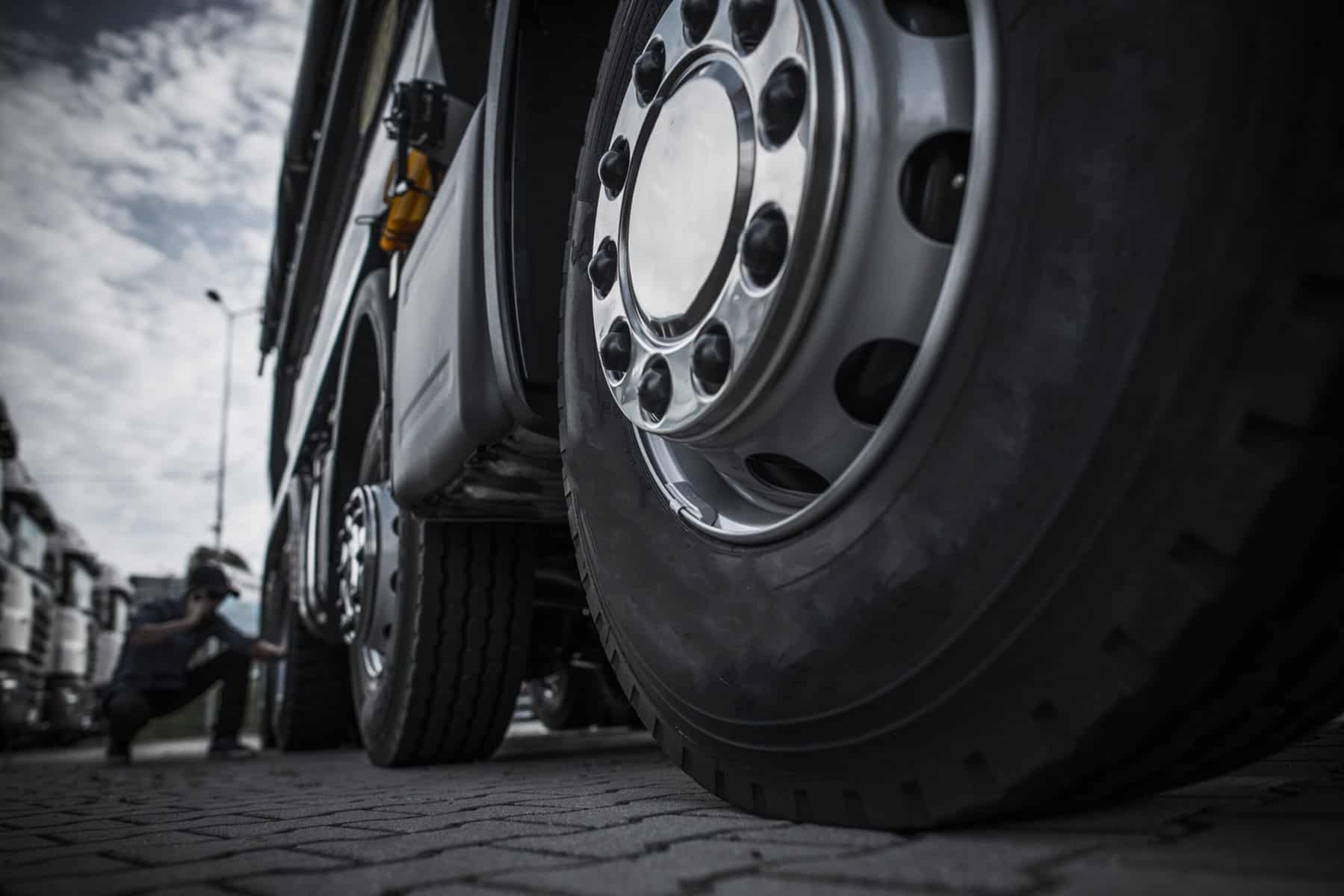What Size Air Compressor for Truck Tires? 9 Major Considerations!
TheToolGeeks.com is a participant in the Amazon Services LLC Associates Program and other affiliate advertising programs. We may earn from qualifying purchases. (Learn More).
Air compressors such as tire inflators make the work easier and faster. Depending on the size of your truck tire, you need to choose the right size air compressor, which is capable of fluffing the needs of filling the truck tire.
When choosing the air compressor, the first issue is what size air compressor for truck tires should you get. Well, the sizing of the air compressor for filling truck or semi-truck tires depends on the CFM, PSI, and air tank size of the air compressor. There are also some other factors to consider, which you will understand from this article. (We’re not gonna confuse you at the beginning of the article)
Without further ado, we’ll request you to ride with us through the whole article to understand everything clearly.

Jump To Page Contents:
What size air compressor for truck tires? (Important Things to Consider)
The air compressor comes in handy when you need to travel in your truck in an area where you know you will not help if your tire gets flat. You can easily use and inflate your tire without seeking professional help.
Considering an air compressor size for filling tires depends on these requirements or factors:
1. Vehicle & Tire Size
Firstly, considering your vehicle and tire size and knowing its requirements is necessary. Check the PSI requirements of the tire, the possible working, and guarantee of its lifespan. For example, a 16 RV tire needs 80-100 PSI.
2. CFM of an Air Compressor
CFM of the compressor is the amount of air (Air Volume) that the compressor can supply to the truck tire. Depending on your need for working with the compressor, your CFM rating can range from 10-15 CFM for normal use to 40-80 CFM for professional use.
3. PSI of the Air Compressor
The PSI of the compressor is a deciding factor, and it needs to be more than the actual requirements of the truck tire PSI. It is a measure of compressed air an air compressor can force through the hose to the truck tire.
The size of the tires determines the PSI ranges for truck tires. If your truck tire needs 80-110 PSI, you need an air compressor with at least 120 PSI. However, if you choose at least 150 PI compressors, it will be great.
4. Tank Size of the compressor
The tank size of the compressor is used to store air so that it is available when you need it. Generally, an air compressor with at least an 8-10 Gallon tank size is ideal for truck tire inflating. A large tank is required if you intend to use the compressor for professional use.
If you need your compressor in a garage or shop, you need a large tank size. Depending on your work, you may need a tank size of 20 to 80 gallons. The larger tank size will require a larger compressor, which means it will also be more expensive.
5. Duty Cycle of the air compressor
Check the duty cycle of the compressor is necessary. That provides the ability of the working capacity of the compressor. If your compressor’s working capacity is (50%), 1-hour, then it will work only 30-40 minutes, then it will need 15-30 minutes rest. And 100 % can easily work for an hour.
6. Inflation Speed
You need to consider the inflation speed of the compressor. The higher PSI compressor can do speedy inflation, and high inflation speed can be achieved on this range of compressors using 150 PSI. You should always consider your truck size, duty work, and PSI while considering the compressor.
7. Hose Length
A hose is used to connect the compressor and the truck tire. The hose can have a screw or button to press on the chunk. Buy a top-quality hose. It should not leak. You need to make sure the hose length of the compressor is not too large because it will slow down the inflating process.
Select your compressor considering your place. You may need compact and portable compressors, but if you need stationary compressors, then they should be large compressors.
8. Power Cord Length
Power cord length is beneficial to reach all the truck tires, and you do not need to move the truck. Depending on your truck length, do not use too long a cord. Also, choose a cable made with double material, as it increases the lifespan of the inflator.
9. Attachments
Choosing an air compressor with attachments makes the life of the user easy. You do not need to buy every other tool and small screws. They come with the compressor in their accessory kit. The accessory kit depends on the brands but mostly checks the air hose, couplers, air guns, pressure regulators, filters, and paint guns.
How to Fill Truck Tires with An Air Compressor?
Inflating the truck tire process needs some tools to help fill truck tires.
Required Tools: an air compressor, a regulator, hose, pressure gauge, and a stem cap.
Choosing an effective air compressor is important according to your needs. If you need it occasionally and not for professional applications, a 4-6 Gallon tank air compressor with 100-120 PSI is good to go.
The regulators are used to check the amount you have in the tank of an air compressor.
The pressure gauge is used to regulate the air pressure in the tire. It will prevent any accident from overflowing the truck tire. The hose is used to connect the compressor with the truck tire. You connect the hose with the truck tire cap.
Inflating the truck tire with a compressor:
- Firstly, make sure your tire is cooled down, do not inflate while it is still hot. It can lead to bursts of tires.
- Connect your air compressor to an outlet near you. You can use a 12 V compressor.
- Switch on the compressor and let the air fill to the max level.
- Connect your air compressor through the hose with the truck tire cap.
- Check through the pressure gauge, the amount of pressure the tire has filled
- Slowly do this process to ensure you do not exceed the required pressure level.
- After reaching enough air pressure level, switch off the compressor
- Now disconnect the compressor and re-attach the cap on the truck tire.

What size air compressor do I need to inflate RV tires?
Selecting an air compressor for RV tire inflation depends on the RV tire PSI requirements. When it comes to truck tires, the PSI mostly depends on their size. But mostly, it ranges from 40-100 PSI.
If your compressor needs a 110 PSI and you have a 100 PSI compressor, there is no way you will be able to inflate the tire. Always choose a compressor keeping your tire requirements into consideration.
A suitable compressor for truck tire inflating is 150 PSI, with 4-6 CFM having 2-4 HP power with a 12 V power source. It will work great for truck tires.
Best Air Compressor for Truck Tires
Experiencing a flat tire can be frustrating when you have nothing around to fix it. For this situation, portable compressors come to mind. These compressors are lightweight, portable, and compact, and you can easily carry them with you anywhere.
These are Some of the best air compressors for inflating tires:
- Viair 00088 88P Portable Air Compressor
- GSPSCN Silver Tire Inflator Heavy Duty
- Portable Double Cylinder Air Compressor Tire Inflator
- TIREWELL 12V Tire Inflator-Heavy Duty
- Slime 40026 Tire Inflator
- Kensun AC/DC Power Supply Portable Air Compressor Pump
- VIAIR 300P Portable Compressor
- CRAFTSMAN Air Compressor, 6 Gallon, Pancake, Oil-Free
- VIAIR 450P-RV Silver Automatic Portable Compressor Kit
- VIAIR – 40045 400P-Automatic Function Portable Compressor
We’ve reviewed the above-mentioned air compressors separately. Please Read:
10 Best Air Compressor for Heavy Duty Trucks – (Detailed Review+Guide)
Conclusion
Air compressors capable of handling and inflating heavy-duty truck tires have special PSI and CFM ratings according to the vehicle’s tire requirements. Considering what size air compressor for truck tires will be ideal for your truck depends on the PSI requirements of your tire.
Most of the tires have PSI requirements ranging under or less than 110-120 PSI, so according to this, you need to consider at least 150 PSI compressors. Always choose your compressor more than the requirements of the truck tire or any other pneumatic tools requirements.
FAQ’s
How much is PSI in a truck tire?
Depending on the truck tire type and size, it can range from 30 to 100 PSI. Although some experts say, 40-44 PSI is ideal for balancing the vehicle’s weight. Most trucks have the required PSI mentioned on their tires.
How do I know what size air compressor I need?
How to know the right size? Check and add all the tools CFM and check each tool’s PSI. Take your highest CFM required tool with its maximum PSI, multiply the CFM of the tool by 1.5, and round it off to the closest gallon. This method will give you the required CFM, PSI, and gallons of the tank in the air compressor.
How to use an air compressor for tires at the gas station?
Using an air compressor at a gas station is easy. You need to attach the compressor’s hose to your tire. The compressor hose has a pressure gauge and nozzles, you need to press its button, and the pressure gauge will pop out (you will get to know the psi in the tire). Simply, when it reaches its max of 42-44 psi, release the hose.
Are 12V air compressors any good?
12V air compressors are great. A compact, portable, quiet, lightweight air compressor is always great. They can handle small pneumatic tools for inflating cars, nailing, trimming, and inflating sports balls. You need to look for PSI, CFM, duty cycle, accessories, portability, and your budget while purchasing an air compressor.
Amazon and the Amazon logo are trademarks of Amazon.com, Inc, or its affiliates.

